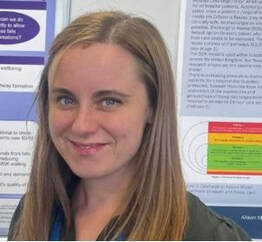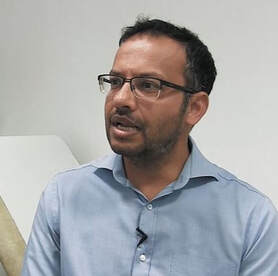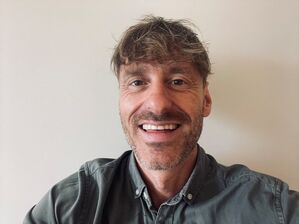Research Projects
|
Michelle Thirlwall - Musculoskeletal Specialist Physiotherapist
Click on the image to hear about Michelle's project on Integrated Musculoskeletal, Pain and Rheumatology Service. The project is aiming to identify the main reasons why patients over the age of 60, who are at risk of falls, continue to engage or not with their balance and strength exercises provided by Musculoskeletal (MSK) Physiotherapists. Shalom Srirangam - Consultant Urological Surgeon Click on the image to hear about Shalom’s experience of using the Research Design Service North West and how the advice helped him. Shalom speaks about his project, the challenges he faced developing his funding applications and about the support provided. Matt Kenyon - Extended Scope Physiotherapist "Research Journey Overview: Addressing Health Disparities and Tendon Pain Management My research journey began in 2015 following the completion of my Masters at the University of Liverpool and presenting my dissertation at an international conference. As a physiotherapist born and raised in the local area, I have been driven with a passion for making a significant difference in an area that ranked among the top 10 most deprived regions in the UK. Early on, I identified two critical issues that compelled me to embark on a research path. Identifying Disparities: Firstly, I observed a staggering 20-year life expectancy gap between the people of Blackburn and those in the most affluent areas of the UK. This disparity underscored the urgent need for targeted interventions to address health inequalities in my community. Additionally, my work in physiotherapy highlighted a concerning trend—patients with chronic health issues, particularly from socioeconomically deprived backgrounds, were repeatedly cycling through our services. This revolving door pattern propelled me to explore the underlying factors contributing to this cycle. Tendon Pain and Beyond: Having developed a specialised interest in tendon pain, I detected a gap in the existing literature—most studies on Achilles tendon pain were conducted on athletes, neglecting a broader demographic. I realised that this condition wasn't exclusive to athletes and was possibly connected to underlying health issues like diabetes, obesity, and other long-term conditions, along with the medications used to treat them as suggested in the literature. My experience contradicted the prevailing perception, as the patients seeking our physiotherapy services were far from athletes. Pioneering Research: Teaming up with a colleague, I embarked on a significant service evaluation involving 573 patients with Achilles pain. The results were revelatory. Our study revealed that individuals diagnosed with Achilles tendinopathy through NHS services exhibited distinctive characteristics, diverging significantly from the athletic profile depicted in existing research. These patients were more likely to have multiple long-term conditions, leading to a higher utilisation of medications for overall health management. This study reshaped our understanding of the Achilles pain patient population. Tailoring Interventions: Armed with these insights, our next endeavour was to design a tailored intervention to effectively manage this debilitating condition. To facilitate this, I joined the Research Scholars Programme through the local Clinical Research Network (CRN), a two-year initiative aimed at enhancing research skills and preparing for grants as a principal investigator (PI). This program allowed me to assemble a world-class research support team and successfully advance to stage 2 of the Research for Patient Benefit application and we are currently waiting to see if we have been successful in securing the funding. Community Engagement: Furthermore, I secured strategic funding from the local CRN, partnering with a fellow physiotherapist to create a community engagement program. This initiative sought to amplify the voices of underrepresented individuals when brainstorming new research ideas or service improvements. The combined efforts of this program and the Research for Patient Benefit grant will enable the co-design of a behaviour change intervention. This intervention will focus on empowering Achilles pain patients to stay active and follow proven exercises to manage their condition, ultimately preventing further deterioration caused by inactivity. Toward Clinical Impact: My journey will hopefully then progress toward a Clinical Academic Fellowship application through the National Institute for Health Research (NIHR). This phase will aim to test the intervention across the UK with both physiotherapists and patients, ensuring its feasibility for a clinical trial. The skills honed during my PhD journey will facilitate this pivotal step. Continuing the Mission: Ultimately, my aspiration extends beyond personal achievement. Armed with refined research skills, I'm committed to supporting my colleagues and service in becoming more research-active, channelling the collective efforts to shape our healthcare provision according to the unique needs of our population. In a nutshell, my research journey has been a dynamic exploration of health disparities, unconventional patient profiles, and innovative interventions. It has transformed my role from a physiotherapist into a early career researcher and advocate for more equitable and effective healthcare solutions." |










